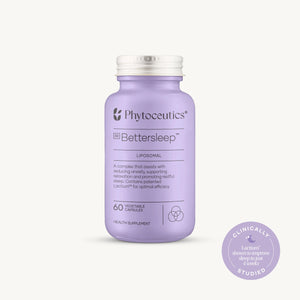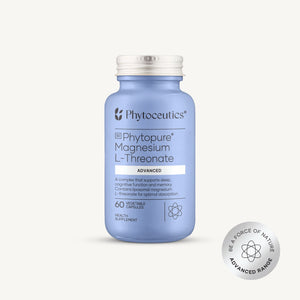In Episode 3 of the Her Health™ Podcast by Phytoceutics®, host Laura Johnston sits down with Dr. Tracy Flowers – GP, Functional Medicine Practitioner, and women’s health expert – to unpack one of the most underrated pillars of well-being: sleep.
From circadian rhythms to sleep stages and supplements, this episode dives deep into why quality rest is essential for cognitive health, stress management, mental clarity, and overall well-being.
Rapid-Fire Sleep Myths
In a quick-fire round, Laura asked Dr. Flowers to rate popular sleep trends from 1 to 10 – separating what’s evidence-based from what’s hype:
Mouth taping – 2: “There’s limited evidence for this and some risk. For anyone with sleep apnoea or nasal obstruction, it might actually be harmful.”
Weighted blankets – 7: “Helpful for some individuals, especially those with anxiety-related sleep issues.”
A freezing cold room – 8 or 9: “Lots of evidence shows that a cold environment improves sleep quality and depth.”
Cooled mattress – 7: “It helps cool core body temperature, but evidence is weaker than for room temperature. Some find it uncomfortable.”
Sleep tracking wearables – 5: “They can help highlight issues and track patterns, but accuracy is limited. For some, they can even cause orthosomnia – where people become obsessed with perfecting their sleep.”
Blue light-blocking glasses – 7: “Some evidence supports them, especially for insomnia or shift workers, since blue light can suppress melatonin and impact the quality of our sleep.”
Melatonin supplements – 7: “Helpful for jet lag, the elderly, or specific sleep disorders, but not necessary for everyone.”
Why Sleep Is the Foundation of Health
Dr. Flowers explained that sleep isn’t just downtime – it’s when the body repairs, the brain consolidates memory, and emotions reset.
“Sleep seems passive, but it’s one of the most active and essential processes for our body and brain.”
She highlighted that we spend about a third of our lives sleeping, and that sleep underpins everything – nutrition, exercise, stress management, and connection.
Yet, despite its importance, a third of people worldwide struggle with insomnia, contributing to what experts now call a sleep crisis.
Understanding the Sleep Cycle
Sleep occurs in cycles lasting 60–90 minutes, alternating between light sleep, deep sleep, and REM (rapid eye movement).
1. Non-REM sleep:
-
Light sleep supports memory consolidation and makes up most of the night (50–60%).
-
Deep sleep (slow-wave sleep) is vital for physical recovery, immune function, and growth hormone release (15–25% of the night). Your body needs this deep sleep to wake up feeling energised and refreshed.
2. REM sleep fuels emotional processing, creativity, and learning – it’s also when most dreaming occurs.
As we age, our sleep need changes:
-
Children: 9–12 hours
-
Teenagers: 8–10 hours
-
Adults: 7–9 hours
From our 50s onward, fragmented sleep becomes more common due to lower melatonin levels.
The Four S’s for Better Sleep Hygiene
Before turning to supplements, Dr. Flowers encouraged listeners to master the foundations of sleep hygiene – her “Four S’s”:
Sight & Screens – Limit blue light and stimulating content before bed to avoid suppressing melatonin. Phones are particularly disruptive due to proximity and engagement.
Substances – Caffeine can stay in your system for up to 10 hours, and alcohol decreases REM sleep, leaving you less rested.
Sameness – Maintain a consistent bedtime and wake time to anchor your circadian rhythm and improve sleep depth.
Stress Management – Incorporate calming rituals like meditation, prayer, or breathwork to reduce nighttime anxiety and improve sleep onset.
Environmental cues also matter. Dr. Flowers recommends a cool room (16–19°C) to to help the body lower its core temperature naturally – a key signal for sleep.
Circadian Rhythm and Morning Light
The circadian rhythm (our internal 24-hour clock) governs wakefulness and rest.
Dr. Flowers stressed the importance of morning light exposure – ideally 5 minutes in sunlight (10 if cloudy, 20 if raining) – to set the body’s internal clock and activate the cortisol awakening response.
Consistent sleep and wake times, paired with morning exercise, reinforce this rhythm and enhance energy levels throughout the day.
The Role of Nutrition and Supplements
Deficiencies in iron, magnesium, vitamin D, vitamin B6, and zinc can all interfere with healthy sleep. These nutrients influence GABA signaling, neurotransmitter balance, and nervous system calm.
Dr. Flowers highlighted three favourites for supporting relaxation and sleep quality:
Magnesium L-Threonate – Crosses the blood–brain barrier to calm the nervous system and improve sleep quality.
L-Theanine – Promotes calm focus without sedation, preparing the mind for rest. Can also be used in daytime for relaxation.
Apigenin – A flavonoid in chamomile, known for its soothing effects on the brain and reducing sleep latency.
Laura’s Ultimate Sleep Stack
Laura shared her own nighttime formula for deeper, more restorative rest – the Bettersleep™, Magnesium L-Threonate, and Apigenin trio.
“Since starting this stack, my deep sleep scores have improved.” – Laura Johnston
This combination supports GABA activity, reduces stress-related sleep anxiety, and promotes restorative deep sleep – all without morning grogginess.
Tracy’s Top Tips for a Good Night’s Sleep
Dr. Tracy Flowers’ top tip is regularity – maintaining a consistent sleep schedule and bedtime routine helps the body recognise cues for rest.
She recommends setting aside an hour before bed for wind-down activities like:
-
A warm bath
-
Journaling
-
Prayer
-
Reading
-
Breathwork
Avoid screens and stressful tasks to shift into a parasympathetic state.
While a bad night may cause sleep debt, Dr. Flowers reminds us that sleep can’t be banked – consistency matters most.
A License To Nap
Dr. Flowers explained how naps are useful for athletes, shift workers, new parents, or those recovering from illness, but frequent daytime naps can disrupt circadian rhythm.
“A license to nap is earned, not automatic.”
Dr. Flowers reminded listeners that sleep is not a luxury but a biological necessity. Prioritising it supports cognitive function, emotional balance, and long-term health, making consistent, quality rest an essential part of daily life.
Use code “HERHEALTH” at checkout for 20% off your next order.









